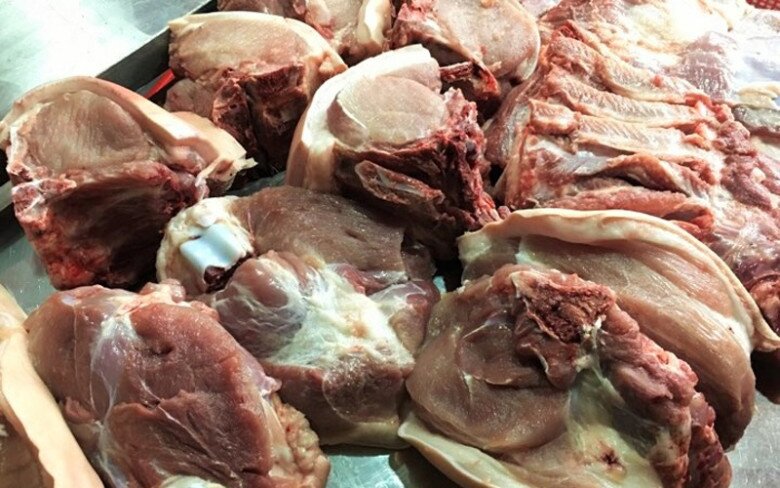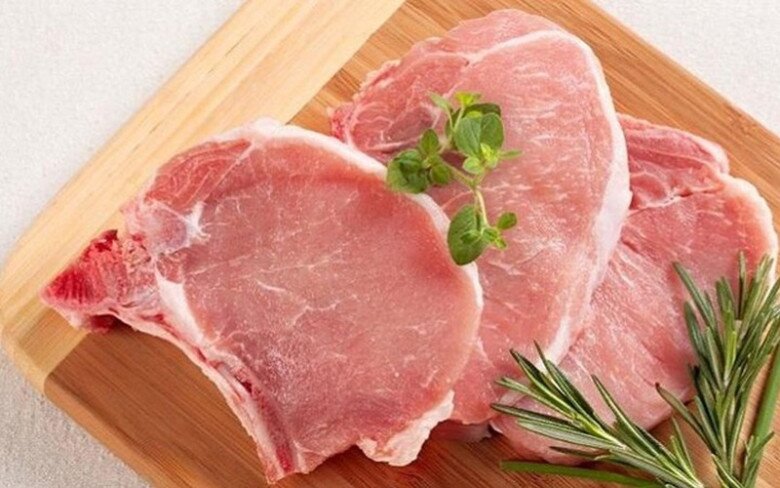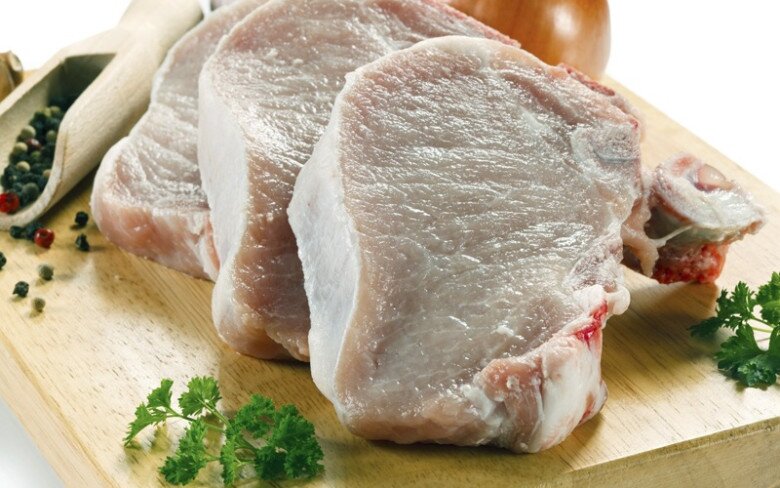Here are seven common but often overlooked signs to remember to become a wise homemaker:
1. Meat without quarantine stamps
No matter how fresh the meat looks, if it doesn’t have a quarantine stamp from the veterinary agency, question its origin. A lot of the meat sold in floating markets could be from pigs that died before slaughter, diseased pigs, or those not processed according to food safety regulations.
Note: Standard meat usually has a red or purple stamp from the quarantine office directly on the skin or rind.
2. Dull color and strange fat – It’s not just an aesthetic issue
Fresh meat will have a natural pinkish-red color that is bright and evenly colored, with white or creamy fat. If you notice that the meat has a dark brown, purplish, or blackish-grey color, it is likely that the meat has been stored for too long, has gone off, or is from a diseased pig. Fat that has turned a strange pinkish hue, appears slightly translucent, or has a yellowish tinge should also be avoided.

Hint: Observe the meat carefully under light; do not just glance at it.
3. Unusual leanness – Don’t be too quick to rejoice
While some people prefer leaner meat, if the meat has almost no fat or an unusually thin layer of fat and a shiny appearance, it is likely meat from pigs raised with leanness-enhancing agents (beta-agonists). Although visually appealing, this type of meat is often dry, tough, and bland, with potential health risks if consumed long-term.

Tip: Choose meat with a marbling of fat and lean, with a natural color and not too shiny.
4. Pig skin with red pores – A warning of meat from dead pigs
Typically, the skin of a pig, when shaved clean, will have white or black pores, depending on its skin tone. However, if you notice reddish or dark red pores, along with purplish meat and deep red lean meat resembling bruised blood, it is highly likely that the meat is from a pig that died before slaughter. This type of meat is unsafe and can easily cause food poisoning.
5. Sticky and slimy meat – A sign of spoilage
Fresh meat should feel firm and slightly bouncy to the touch, with a dry or slightly moist cut surface. If the meat feels sticky, slimy, and slippery, it is certain that bacteria have invaded, and decomposition is occurring. This type of meat, when cooked, will emit a strong putrid or rancid odor, ruining the dish.

6. Meat with an odd smell – Sniff carefully to avoid mistakes
Scent is one of the most recognizable criteria. Delicious meat has a mild characteristic odor, neither pungent nor sour nor strange. If the meat has a musty, sour, or pungent smell, do not buy it, even if it looks “fresh.”
Note: Do not hesitate to bend down and smell the meat; it is the “survival instinct” of a wise homemaker!
7. Meat is soft and lacks elasticity
One quick test is to press the meat with your fingertip. If the meat is soft and dented without bouncing back, it has been stored for too long or improperly frozen. Conversely, fresh meat will be firm and elastic, not crumbly.
Tips for choosing fresh pork
– Color: Fresh pink, no bruising.
– Smell: Fresh, not fishy or sour.
– Elasticity: Bounces back when pressed.
– Origin: Has a quarantine stamp and is purchased from a reputable source.
The Ultimate Guide to Boiling Meat: A Surefire Way to Eliminate Odor and Enhance Flavor
Introducing the ultimate guide to boiling meat: while it may seem simple, achieving that delicious taste is an art. Say goodbye to off-putting odors and hello to mouthwatering flavors. With our expert tips, you’ll learn how to transform even the strongest-smelling meats, from goat to duck and beef to tripe, into a delectable feast. No more unpleasant surprises from less-than-fresh pork – it’s time to reclaim your appetite!
“A Squeeze of Lemon: The Simple Hack to Keep Rice Fresh in Hot and Humid Climates”
In hot and humid climates, cooked rice can quickly spoil if left at room temperature. A simple trick to prevent this is to add a slice of lemon while cooking the rice. This folk method not only has scientific backing but also enhances the aroma and flavor of the rice, while extending its shelf life.



































